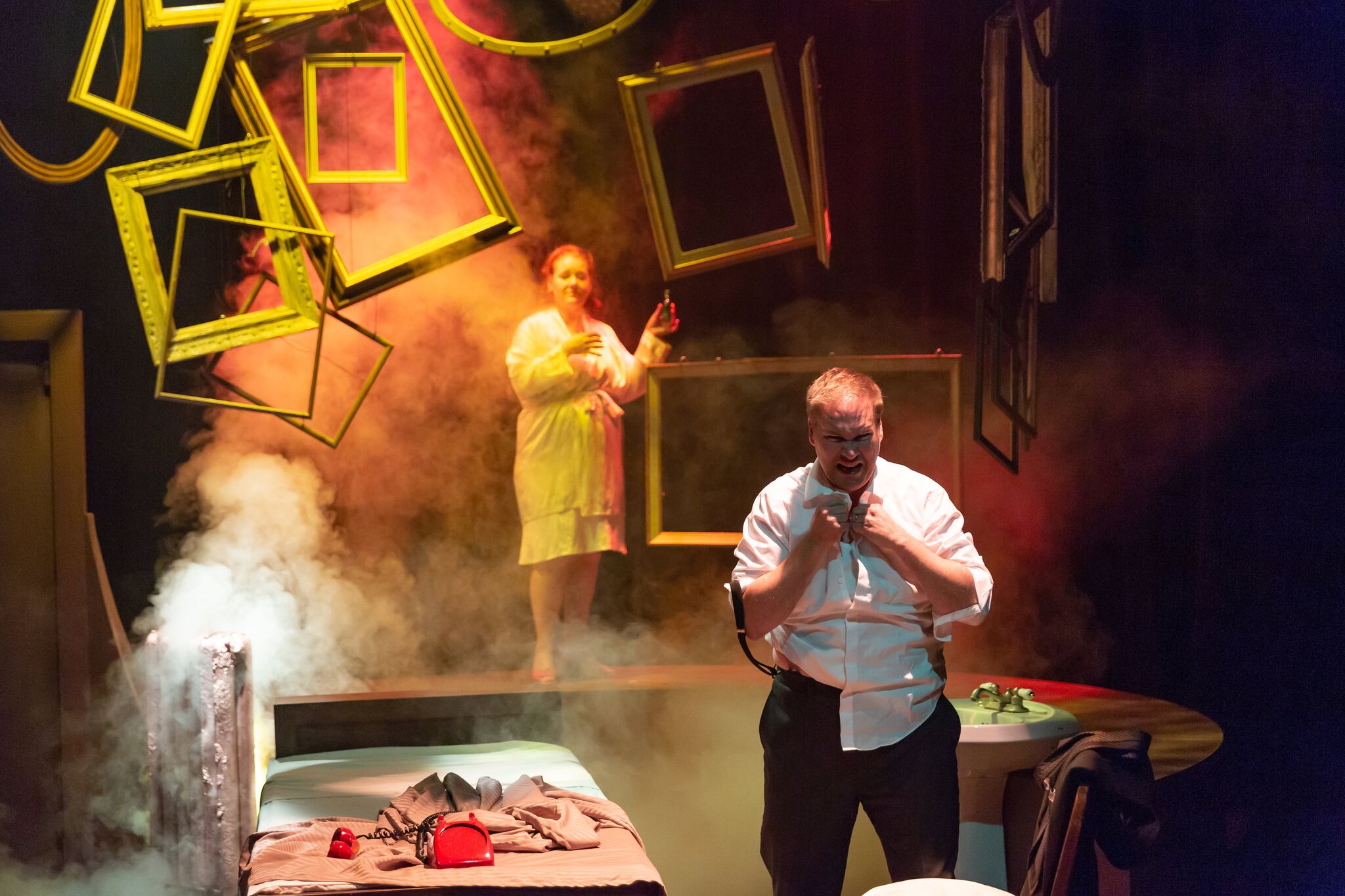A SUCCESSFUL NIGREDO HOTEL FROM CITY OPERA VANCOUVER
Nic Gotham and Ann-Marie MacDonald, NIGREDO HOTEL: Sarah Vardy (Sophie), Tyler Duncan (Raymond), Instrumental Ensemble, Charles Barber (conductor), Alan Corbishley (stage director), John Webber (lighting and set design), Barbara Clayden (costumes), The Cultch, September 20, 2018.
All photos by Michelle Koebka
Starting off from The Lost Operas of Mozart in October 2016, the one-act chamber opera Nigredo Hotel is now the third recent presentation by City Opera – the little opera company that could! A collaboration between composer Nic Gotham and librettist Ann-Marie MacDonald, Nigredo Hotel stands as one of the few Canadian operas to have enjoyed multiple performances at home and abroad. Originally commissioned by Tapestry New Opera Works and premiered in Toronto in 1992, it has been performed as far afield as the United Kingdom and Australia. As the work courts a vast sequence of psychological and dramatic turns, it requires courageous and probing performances, and that it mainly received in the current production from baritone Tyler Duncan and soprano Sarah Vardy, underpinned by the inspired support of conductor Charles Barber’s instrumental ensemble.
The title of the opera derives from the concept in Jungian psychology of nigredo or ‘dark night of the soul.’ MacDonald’s libretto starts from a brain surgeon named Raymond who, after crashing his car, takes refuge in a shoddy hotel run by Sophie, a beautiful but crazed woman. Raymond is ultimately forced to confront the darkness within his own nature, which is in fact embodied in Sophie, who represents his anima or ‘inner feminine side.’ The libretto, which eschews the traditional operatic devices of versification and rhyme, is highly literate, clever, and full of unexpected twists. The plot moves swiftly and purposefully, though the action in the last third of the opera might be somewhat demanding for an audience not versed in the psychoanalytic underpinnings of the story. Gotham’s score, strongly influenced by jazz harmonies and rhythms, demands a broad range of extended performance techniques from the four musicians, including tongue-flicks, key-clicks, glissandos, bowed percussion, string scraping, and improvisation. The vocal writing provides a satisfying balance between dramatic declamation and lyricism, and the varying strands of recitative, aria, and duet merge into a smooth flow that propels the action forward.
Both lead singers showed great fortitude and commitment in attacking the physical and psychological demands of their roles. Tyler Duncan possesses a naturally powerful and resonant baritone voice which, combined with his meticulous enunciation, served him well in the role of Raymond. Every word he sang was audible and intelligible, even while he was running across the stage, moving heavy objects, or stripping away one layer of clothing after another. I especially admired the way he brought to the fore his character’s extremes of mood – defiant, bewildered, frightened, pleading – and his emotional vulnerability. Soprano Sarah Vardy’s keen sense of comedic timing and quirky stage presence brought strong tangibility to her portrayal of the bizarre hotelier Sophie. In her hands, the character came across as simultaneously inscrutable, disdainful, willful, petulant, and menacing – a complex mix indeed.
Perhaps the only downside was that Vardy’s voice was neither as large, or her enunciation as clear, as her partner’s, and sometimes her words were covered by the music. Similar difficulties emerged whenever her voice was amplified from behind the scenes, which was presumably meant to sound ‘spooky’ in degree but largely succeeded in making the text almost impossible to discern. While one cherished the chemistry between the two leads, this disparity in verbal clarity may have produced the slightly confusing impression at the opera’s denouement where, following the Jungian template, dark trauma (nigredo) ultimately makes way for enlightenment (albedo) and self-integration (rubedo).
Charles Barber and his 4-piece jazz ensemble (clarinet/bass clarinet, double bass/electric bass, percussion, and piano) tackled the score with effortless virtuosity. The bewildering array of percussion sounds, the extended performance techniques for all instruments, and the passages of free improvisation were always coherent and powerfully atmospheric. The music itself was a brilliant complement to the surrealistic action: eerie, edgy, with energetic rhythms and pungent harmonies.
John Webber’s set design, which arranged numerous suspended picture frames in the shape of a large and sinister face, was both functional and appropriate to the sinister mood of the story. The minimalist walls and furniture were sufficient to give the viewer the impression of a seedy hotel. They were also simple and unobtrusive enough to allow the singers room to maneuver around the small stage and realize the spatial variety visualized by director Alan Corbishley.
There were certainly ambitious psychological themes and dramatic tensions in Gotham and MacDonald’s creation and the overall chemistry achieved in this production clearly affirmed Nigredo Hotel’s continuing place in the repertory. Given the limited shelf life of most contemporary operas, City Opera has done admirable service in perpetuating a worthy Canadian inspiration.
© Nicolas Krusek 2018


